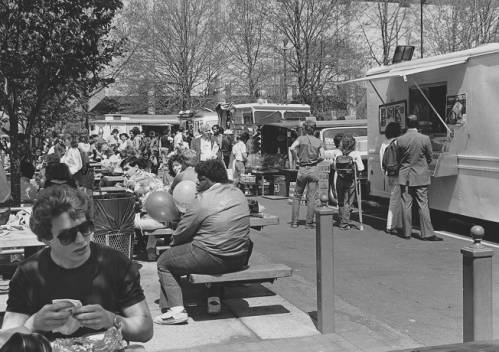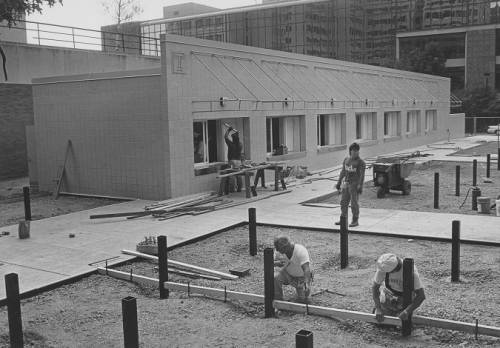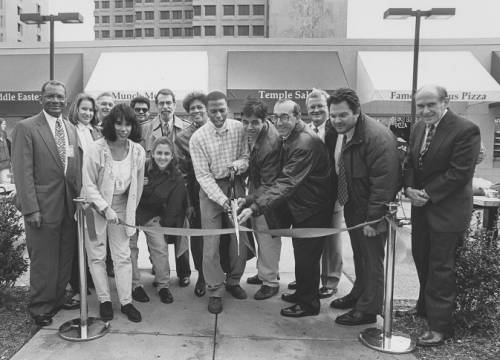By Clare McCabe, PhD student at Temple University
In 1994, the food trucks who typically assembled at 13th and Montgomery were given notice that they’d need to leave: Temple University was constructing a new academic building. The trucks, who had been at that location for twelve years, were considered an integral part of campus culture. The 1994 Templar, the Temple University yearbook, lamented that “it will hardly seem like campus without the trucks in the middle of everything.” The trucks were not given a new location to relocate to, and vendors waited for news of their fates with little communication from the university. Feim Amzovski, owner of Fame’s Famous Pizza and the spokesman for the group of trucks, was concerned that the university was taking advantage of truck owners: “Many of the truck owners are non-English speaking people who could easily be misled by the university.”

The University’s answer was not a relocation of the trucks, but instead a new offer altogether. Vendors would be offered a spot in a new university owned and operated food court on 12th street, next to Anderson Hall. Vendors from the original “pad” would be offered right of first refusal, and seven vendors accepted (four of which are still there today- Fame’s, Eddie’s Richie’s, and Orient Express). The costs for the new construction, nearly $715,000, would be recouped by rent paid by tenants. According to the 1996 Templar, owners paid “nearly five times more in rent, as much as $1500, at the new court.”

So why Temple? Why stay? For Jim Amzovski, of Fame’s Famous Pizza, he likes the students, and he likes having off on the weekends. Students are easy customers, he told me, not picky, and understanding when you’ve run out of something: “We have a harder time with the employees.” For the University, the new food court spot was chosen because it drew congestion away from the overcrowded original vendor hub at 13th and Montgomery. But for food truck owners, who suddenly found themselves on the edge of campus instead of its heart, it was disorienting. “At that time, there was nothing on this side [of campus],” Amzovski told me. “They pushed us out of main campus…but eventually [students] learned where we were at and started coming.”
The 12th street food court represents the University’s first attempt to bring food trucks into the Temple bureaucratic umbrella. Food trucks had long been a part of campus culture and have been used in marketing materials for potential students, but with the food court, they became tenants as well. As food trucks, they are definitionally potentially mobile, inconstant. Though many of the trucks on campus are currently immobile and constant, potentially, they could leave. They are not a part of Temple’s official food service offerings, and so as a result cannot be controlled and regulated in the same way. As stationary tenants in a food court, however, Temple can exert greater control over food service offerings and establishments.

Though the vendors on the Wall are not technically food trucks anymore, many of them once were, and their stories are relevant in any examination of Temple’s food culture. Temple University continues to exert regulatory influence over food trucks, like in the form of the creation of the Special Vending District surrounding Temple’s campus. The Special Vending District, which was created in 2015, capped the number of vendors who could park trucks and carts on campus. In addition, any vendor who wishes to take time off now must first notify the University and the city. It also changed regulation regarding the inheritance of permits, an issue that remains a difficult subject for many food truck owners.
But for the physical vendors on the wall, Temple University is not just a specter of potential regulation, it is also a landlord. As Temple administrations come and go, Amzovski told me that things could change very quickly, and a responsive and helpful landlord could transform into someone very difficult to work with. While the current administration, he says, is responding to needs quickly and is helping to enact badly needed renovations, during the time the university was closed because of COVID, the previous administration continued to charge vendors on the wall rent. “At times, you’re working for nothing just to try to pay the rent,” Amzovski said. If Temple wants regulatory control over the food trucks and food service on campus, they should accept the responsibilities which come with that regulation and treat vendors and owners like the integral part of campus that they are.
To connect with Clare about her work, please visit our Connect page.